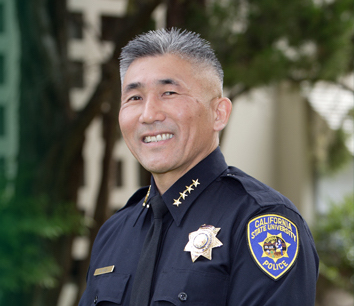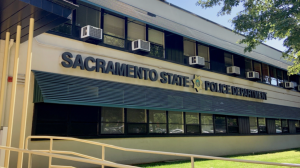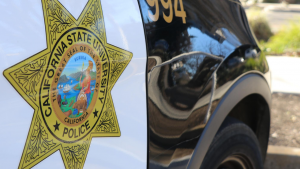Sac State Police Chief Mark Iwasa announces retirement
University seeks campus community feedback in search for next chief

Sacramento State Police Chief Mark Iwasa has announced he will retire from Sac State in the summer. Iwasa has worked at Sac State for 10 years. Photo courtesy of Sacramento State.
March 23, 2021
Sacramento State Police Chief Mark Iwasa announced he will retire from the university after 10 years of service, according to a SacSend email from Jonathan Bowman, Sac State’s CFO and vice president for administration Tuesday.
Iwasa told The State Hornet it was just time to retire after being in this profession for 37 years.
According to Bowman, Iwasa’s departure is planned to occur during the summer. Sac State will utilize an external search firm for the next chief upon consultation with Sac State President Robert Nelsen and human resources.
“The campus is carefully and sensitively determining how to proceed with recruiting his successor,” Bowman said. “This position is critical, as the police chief is accountable for much more than oversight of officers and campus law enforcement.”
The police chief is responsible for preparing and responding to campus emergencies such as the COVID-19 pandemic and recent wildfires and serving as an incident commander in the Emergency Operations Center, according to the email.
Iwasa said the nature of policing is that people must be able to face whatever comes their way because people can never know what’s going to happen from one moment to the next and can never predict what could be a safety issue.
“You saw in the country in the last week or so, we’ve had a couple of tragic things that have happened and those can happen anywhere,” Iwasa said. “People in the one in Colorado recently were just walking into a store to go shopping and tragedy struck. So law enforcement is about being able to read what’s going on, adjust to it and resolve situations as they unfold in front of you.”
Iwasa added that the COVID-19 pandemic and the wildfires throughout 2020 are all fairly unusual circumstances. He said he thinks Sac State PD were able to be flexible and serve the campus well in those situations.
“Sacramento State is seeking candidates who understand the needs of the campus community, are committed to the tenets of 21st Century Policing, and can facilitate the process of reimagining what policing could look like on campus,” Bowman said.
Established by President Barack Obama, the 21st century policing task force “sought to identify best practices and offer recommendations on how to promote effective crime reduction while building public trust,” according to the California State University website.
Sac State will receive feedback through shared governance throughout the search for the next campus police chief. The university will work with ASI to identify two students to serve on the search committee and include representation from the Faculty Senate, the University Staff Assembly and other stakeholders from across the campus, according to the email.
“With the recruitment of the next chief I think it is important for them to get to know our police department, what we do, how we serve our campus, [and] not to be too influenced on rhetoric that tends to surround policing across this country,” Iwasa said regarding what those in the search team should keep in mind.
Open virtual forums will be held where attendees can address the final candidates, according to Bowman.
“I think that policing, on a campus and certainly in all parts of this country, has shifted somewhat in what is expected and what the public wants to see [from] law enforcement,” Iwasa said. “So I think that the incoming chief is going to have to be very attuned to what the community is looking for. But all the while keeping an eye on the primary mission of protecting the students and the employees.”
Iwasa received a bachelor’s degree in economics with a minor in criminal justice and a master’s degree in public policy and administration at Sac State.
“While Chief Iwasa accomplished many impactful initiatives over his career, he will be best remembered for advocating, expanding, and professionalizing our Community Service Officer (CSO) program,” Bowman said.
Iwasa opened the Police Department Service Center in the University Union, providing services such as LiveScan fingerprinting and a centralized lost and found, according to the email. He also established a security division within the police department, overseeing installation of video security systems, intrusion alarms, enhanced blue light emergency phones and body-worn cameras for sworn officers.
“I really want to commend the CSO’s who are the student interns who work for us, because they were out there all day all night, setting up on their posts, being very vigilant,” Iwasa said regarding the decline of crime on campus during the COVID-19 pandemic. “They were key to detecting a lot of crimes that were about to happen and we hope to keep the campus safe through their efforts as well.”



































































































































